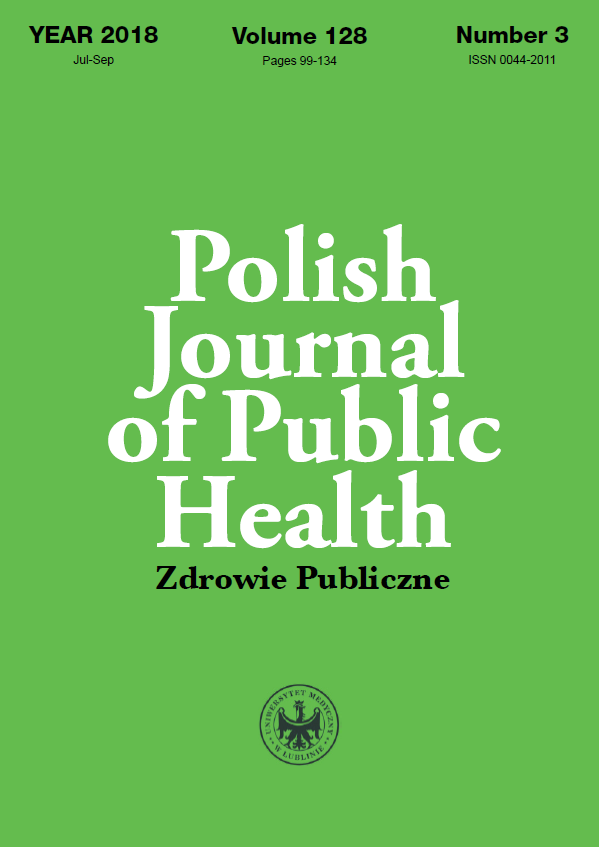The quality of sexual life of women with menopause
DOI:
https://doi.org/10.2478/pjph-2018-0021Keywords:
women, menopause, hormone replacement therapy, sexual activityAbstract
Introduction. The approach to women, menopause and its consequences have changed – the perimenopausal period has stopped being treated as the end of femininity, career and sexual activity. However, symptoms coexisting with menopause influence health and female’s life quality. A decrease of sexual activity is observed as one of the most frequent symptoms, and it is induced by physiological and psychological factors.
Aim. Assessment of sexual life quality among women with menopause and defining the main factors influencing this area.
Material and methods. Thanks to an original questionnaire composed of 28 questions, single and multiple choice, 200 women in the perimenopausal period were examined between July and September 2017.
Results. The number of 200 women in perimenopausal period were chosen accidentally. The questionnaire was filled out via the Internet. Statistically significant factors occurred to be: level of education – higher education is connected with more frequent sexual activity, professional activity – 81% of working women remain sexually active while 73% of non-working females deny being sexually active. Hormonal Replacement Therapy does not influence the frequency of sexual contact but it alleviates vagina dryness, and provides a higher level of agitation during cohabitation.
Conclusion. Higher educated and professionally active women declare better life satisfaction and see themselves as attractive. However, marital status remains meaningless as well as Hormonal Replacement Therapy. It was observed that men from rural areas and towns initiate sexual contact more often.
References
1. Bakalczuk S, Bakalczuk G, Jakiel G. Menopauza a zaburzenia seksualne kobiet. Seksuol Pol. 2005;2(3):74-6.
2. Cajdler-Łuba A, Sobieszczańska-Jabłońska A, Nadel I, et al. Co to jest menopauza? In: A. Lewiński (ed) Menopauza bez tajemnic. Warszawa: Wydawnictwo Lekarskie PZWL; 2006. p.13-22.
3. Frey BN, Lord C, Soares CN. Depression during menopausal transition: a review of treatment strategies and pathophysiological correlates. Meno¬pause Int. 2008;14(3):123-8.
4. Barnaś E, Krupińska A, Kraśnianin E, et al. Funkcjonowanie psychospołeczne i zawodowe kobiet w okresie okołomenopauzalnym. Prz Menopauzalny. 2012;4:296-304.
5. Bręborowicz GH. Położnictwo i ginekologia. Warszawa: Repetytorium. Wydawnictwo Lekarskie PZWL; 2010. p 315-319, 375-377.
6. ESHERE Group: van Baak, Marleen, Evers, Johannes. Perimeno¬pausal risk factors and future health. Human Reproducation Update. 2011;17(5):706-17.
7. Janicka K. Wpływ terapii hormonalnej na styl poznawczy i depresję kobiet w okresie menopauzy. Prz Menopauzalny. 2008;2:61-8.
8. Kampioni M, Stecka-Panieńska P, Wilczak M. Rola kompleksowego postępowania terapeutycznego w zaburzeniach nastroju oraz dysfunkcjach seksualnych u kobiet w okresie okołomenopauzalnym. Prz Ginekol Położ. 2007;(4-6):173-82.
9. Ziaei S, Moghasemi M, Faghihzadeh S. Comparative effects of conven¬tional hormone replacement therapy and tibolone on climacteric symp¬toms and sexual dysfunction in postmenopausal women. Climacteric. 2010;13:147-56.
10. Bińkowska M, Jakiel G. Terapia hormonalna okresu menopauzy – przez skórna droga podania. Prz Menopauzalny. 2012;4:281-6.
11. Norwitz E, Schorge J. Położnictwo i ginekologia w zarysie. Menopauza i hormonalna terapia zastępcza. Warszawa: Wydawnictwo Lekarskie PZWL; 2006. P. 62-3.
12. Pertyński T, Stachowiak G. Poprawa jakości życia seksualnego jako cel hormonalnej terapii wieku menopauzalnego. In: T. Paszkowski (ed). Postępy w medycynie menopauzy. Lublin: Wydawnictwo IZT; 2009. 247- 57.
13. Baranowski W, Dębski R, Paszkowski T, et al. Rekomendacje Polskiego Towarzystwa Menopauzy i Andropauzy dotyczące stosowania lokalnej terapii hormonalnej u kobiet w okresie menopauzy. Prz Menopauzalny. 2011;4:263-6.
14. Drews K, Seremak-Mrozikiewicz A, Pieńkowski W. Ginekologia geri¬atryczna. Menopauza. In: Z. Słomko (ed). Ginekologia t.1. Warszawa: Wydawnictwo Lekarskie PZWL; 2008. p. 431-49.
15. Żołnierczuk-Kieliszek D, Kulik TB, Pacian A, et al. Wykształcenie i status zawodowy a jakość życia kobiet w wieku około-i pomenopauzalnym. Med Ogólna. 2010,16:15-23.
16. Łukasiewicz M, Lew-Starowicz Z. Orgazm a menopauza w życiu kobiety. Prz Menopauzalny. 2008;1:49-53.
17. Makara-Studzińska M, Wdowiak A, Bakalczuk G, et al. Wpływ tera¬pii hormonalnej na poziom depresji i jakość życia kobiet w wieku okołomenopauzalnym, zamieszkujących tereny wiejskie. Prz Menopau¬zalny. 2009;5:284-9.
18. Bello F, Daramola O. Attitude to the Menopause and Sex amongst Middle- Aged Women in a Family Medicine Clinic in Ibadan, Nigeria. OGIJ. 2016, Article ID 2031056, http://dx.doi.org/10.1155/2016/2031056
Downloads
Published
Issue
Section
License
Copyright (c) 2019 Polish Journal of Public Health

This work is licensed under a Creative Commons Attribution-NonCommercial-NoDerivatives 3.0 Unported License.


